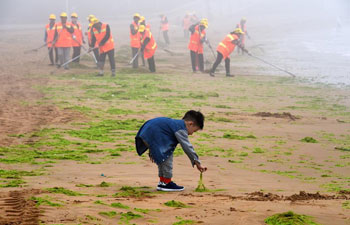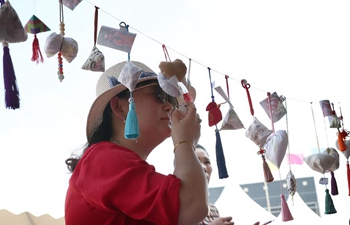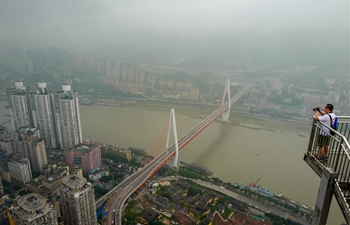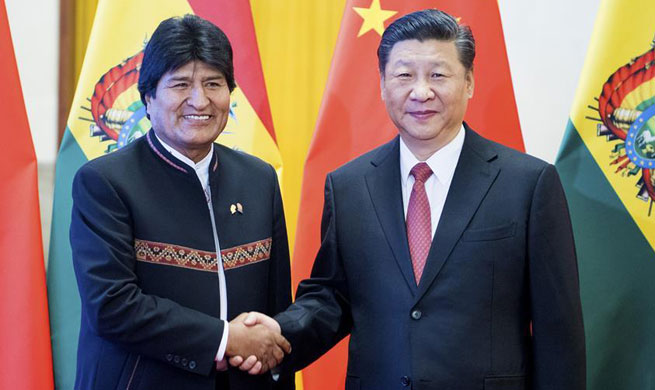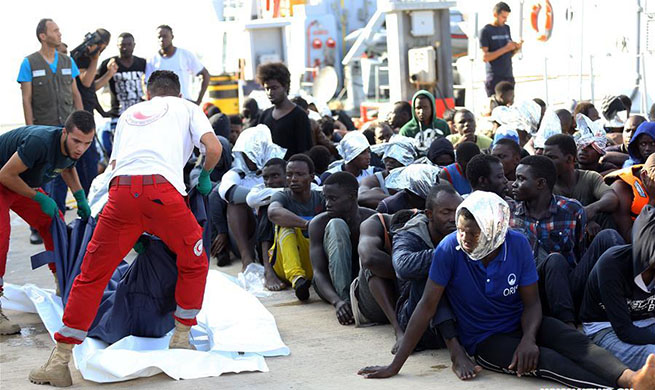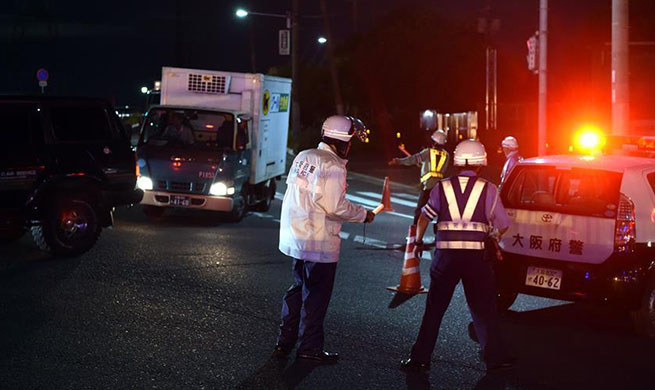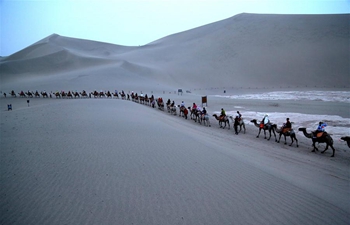DAMASCUS, June 19 (Xinhua) -- The drums of war could be heard banging again in southern Syria as the Syrian army continued to send reinforcements to launch a wide-scale military offensive amid reports of failing Israeli-Russian talks to reach an agreement about the situation there, a pro-government newspaper said Tuesday.
The pro-government al-Watan daily said the battle between the Syrian army and the foreign-backed rebels are inching closer, particularly in the western parts of the southern provinces of Daraa and Quneitra.
It said the eastern part, in the countryside of Sweida province, is already witnessing battles amid the advance of the Syrian army in that part of the country.
The situation in Daraa, near Jordan, and Quneitra, near the Israeli-occupied Golan Heights, has been subject to negotiation by Russia, Israel and the United States.
The deal was said to have focused on the withdrawal of Iranian-backed forces from areas in southern Syria, the evacuation of rebels from areas they control in Daraa and Quneitra, and the return of the army to border areas with Jordan and Golan Heights.
While the talks have been ongoing since last month, the Syrian army has also been sending reinforcements to launch the offensive should the talks fail.
The al-Watan newspaper said the Israeli-Russian talks had failed.
The Israelis have recently demanded the withdrawal of Iranian forces from all of Syria, not only the southern part, while the Syrian government side said that the presence of the Iranian military experts and forces are not for negotiation.
In a recent interview, Assad said the Iranian-Syrian relations are strategic and not subject to any settlement in the south, adding that the Israelis are trying to provoke and embarrass Iran through their demands.
Assad charged that Israel was hindering the reach of a settlement for the situation in southern Syria as it supports the rebels in that area and prevents them from accepting to leave.
On June 17, Israeli Prime Minister Benjamin Netanyahu warned that Israel will take further actions against Iran and its allies in Syria to prevent them from establishing a military foothold near the border of the Israeli-occupied territories of Golan Heights.
Netanyahu told the ministers that he had talked about that with Russian President Vladimir Putin and U.S. Secretary of State Mike Pompeo over the weekend.
"I reiterated our guiding principles regarding Syria. First, Iran needs to withdraw from all of Syria. Second, we will take action -- and are already taking action -- against efforts to establish a military presence by Iran and its proxies," he said.
"We will act against these efforts anywhere in Syria," he said, stressing that Israel could act both close to the border and deep inside Syria.
So it seems that Israel's demand of the Iranian forces' withdrawal from Syria is one hurdle, and the second one is the Syrian demand for the U.S. forces to withdraw from the al-Tanf area in southern Syria as a prelude to any deal in southern Syria.
The U.S. forces have been positioned in al-Tanf, near the Iraqi border, since 2014 and the Syrian government demands the withdrawal of the U.S. forces from that area.
"The battle of the south has become closer than any time before and the Zionist occupation (Israel) will not be able this time to protect its mercenaries inside Syria as the army is determined to win the battle quickly," a Syrian military source was cited by al-Watan newspaper as saying.
Meanwhile, Muhammad Majid al-Khatib, a commander in one of the rebel groups in Daraa, was cited by al-Watan as saying that a recent U.S.-British-Russian meeting about southern Syria has resulted in big differences, noting that the government forces will launch the offensive in southern Syria soon.
It's worth mentioning that some of the aforementioned areas in southern Syria are included in a cease-fire agreement supported by Russia and the United States, but the decision to begin an offensive comes after the Syrian army wrested back control over the entire capital Damascus.
The Syrian forces also offered a reconciliation deal for the rebels in southern Syrian areas, but the rebels turned them down.
Also, some militant groups in southern Syria had pledged alliance with the Islamic State (IS), which explains the desire of the Syrian army to recapture those areas and end the cross-border threats on Syria.
The situation in that part of the country is expected to be inflammatory, particularly as the United States warned last month that it would take "firm and appropriate" measures "to protect the cease-fire in southern Syria if President Bashar al-Assad forces moved against the rebels there.
In its report Tuesday, al-Watan said the Syrian army started artillery fire against the rebels in the city of al-Hara in the northern countryside of Daraa and the surrounding areas coupled with similar shelling on the rebels' positions in Quneitra.
Earlier this week, Syria's Defense Minister Ali Abdullah Ayoub visited Syrian military positions in southern Syria, which was read by observers as a message that the war will start soon in that region.
A day earlier, state news agency SANA said the Syrian army foiled an attack by the militant groups on its military posts in Quneitra.
On Tuesday, SANA said the rebels in the eastern countryside of Daraa fired several mortar shells on the residential neighborhoods in the adjacent Sweida city, which has remained relatively safe during the war in Syria.
However, the countryside of Sweida has witnessed the war between the Syrian army and the IS militants.
The local media said the Syrian army brought in more reinforcements to the countryside of Sweida as part of the military operations against IS.




